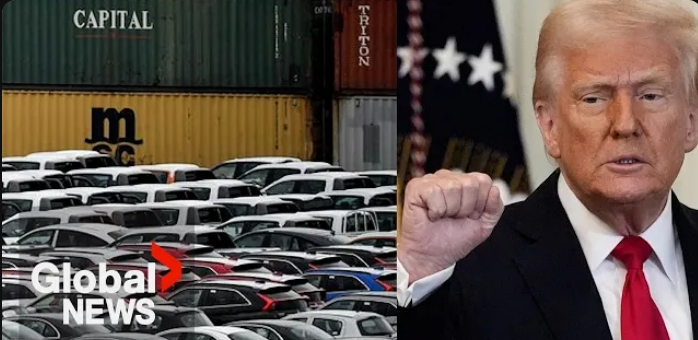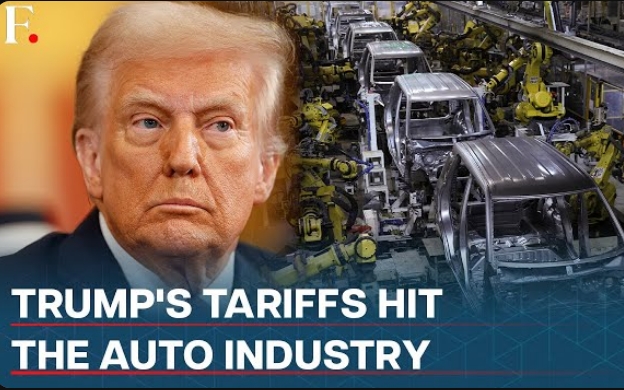Trump’s 25% Auto Tariff: A Shocking Blow to Indian Carmakers?
The U.S. auto industry just got a major shake-up! Trump’s 25% auto tariff on imported vehicles and parts has sent ripples across global markets, and India isn’t immune to the impact. While the move aims to boost domestic production in the U.S., it poses significant challenges for exporters—especially Indian carmakers and auto component suppliers. Among them, Tata Motors appears to be the hardest hit due to its subsidiary Jaguar Land Rover (JLR), which relies heavily on the U.S. market.
Tata Motors Faces the Biggest Blow from Trump’s 25% Auto Tariff
Tata Motors, the owner of JLR, has a lot riding on the U.S. market. With about 22% of JLR’s total sales coming from the U.S., a 25% auto tariff could mean higher vehicle prices, weaker demand, and thinner profit margins.
Investors are already wary—Tata Motors’ stock tumbled by 5% after the tariff announcement. If JLR passes on the extra cost to consumers, it risks losing price-sensitive buyers to competitors like BMW and Mercedes, who might find alternative ways to navigate the tariff.
For further insights on this development, check out Reuters’ report.
JLR’s Possible Strategies to Counter the Impact
JLR currently exports vehicles to the U.S. from its Slovakia-based plant, which will be directly affected by the tariff. Here are some possible strategies it might consider:
Boosting Local Production: Shifting production to existing U.K. facilities or setting up a North American base could help JLR avoid tariffs, but this would require heavy investments and time.
Absorbing Costs: To stay competitive, JLR might choose to take the tariff hit instead of passing it on to customers. However, this would reduce profit margins significantly.
Strategic Partnerships: Collaborating with American manufacturers to assemble cars locally could be another option to bypass the tariff.
Impact on Indian Auto Parts Suppliers: Who’s at Risk?
It’s not just JLR—Indian auto component manufacturers that supply to global carmakers could also feel the heat. Major Indian players like Sona BLW Precision Forgings, Samvardhana Motherson, and Bharat Forge supply key auto parts to companies that export vehicles to the U.S. If global automakers scale back their exports due to the 25% auto tariff, demand for Indian-made parts could drop.
Key Indian Suppliers Likely to Be Affected
Sona BLW Precision Forgings – A large chunk of its revenue comes from exports, making it vulnerable to any slowdown in global car production.
Samvardhana Motherson – With a presence in multiple international markets, a dip in demand from the U.S. could indirectly affect its business.
Bharat Forge – As a leading supplier of forged components, any disruption in exports from Europe and Asia to the U.S. will impact its revenue.
For a more in-depth analysis, check out this Economic Times report.
Wider Implications for India’s Auto Industry
Even though India’s direct vehicle exports to the U.S. are relatively low, the industry isn’t safe from the aftershocks. Global supply chain disruptions and weakened demand could hit Indian automakers indirectly.
The market is already reacting—the Nifty Auto index fell by 1.6%, signaling investor concern. Companies like Ashok Leyland, Eicher Motors, and Hero MotoCorp also saw declines in their stock prices, reflecting the uncertainty surrounding global trade.
How Indian Automakers and the Government Might Respond
The Indian government and carmakers will need to adopt proactive strategies to mitigate the impact of Trump’s 25% auto tariff. Here’s how they might respond:
Trade Negotiations: India could push for exemptions or favorable trade deals to reduce the tariff’s impact.
Diversifying Export Markets: Expanding into alternative regions like Southeast Asia, the Middle East, and Africa could help offset losses from the U.S. market.
Increased Localization: Setting up production bases in key markets to avoid future tariffs could be a long-term solution.
For the latest updates on India’s trade policies and responses, visit FirstFT.
Final Thoughts: A Bumpy Road Ahead for Indian Automakers?
Trump’s 25% auto tariff is a tough roadblock for Tata Motors, JLR, and India’s auto part suppliers. While JLR is in the direct line of fire, the entire Indian automotive ecosystem could face secondary shocks from global trade disruptions.
The coming months will be crucial. How well these companies adapt—whether through new trade strategies, shifting production, or finding alternative markets—will determine whether they hit the brakes or find a detour around this challenge. The road ahead might be bumpy, but with the right strategies, Indian automakers could still stay in the race.

